-
Just like every human being has good and bad points so also every government does some good and has areas where it could do better. Article gives details of the good and the bad.
If someone said
that Prime Minister Narendra Modi over-promises I would agree.
Having said that
Indians are impatient, resistant to change, want progress as long as it does
not affect their lives, will praise M S Dhoni to the sky one day only to stone
his home the next.
This article jogs your memory with achievements and shortcomings of this government.
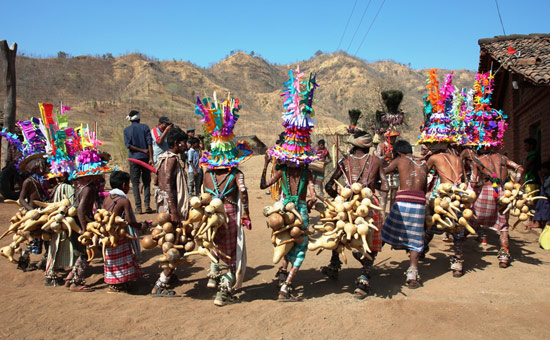 Rajbari Holi celebrated by Adivasis in Satpura Hills. Only dance, no water no colour.
Rajbari Holi celebrated by Adivasis in Satpura Hills. Only dance, no water no colour.
One, this year I spent Holi with Adivasis at Kathi
village in Satpura Hills. It is about 100 kms from Maharashtra’s Nandurbar town
and Gujarat border.
We drove from
our base village of Dhadgaon to adivasi villages in the interiors to eventually
reach river Narmada. Outside virtually every home was a toilet. In July 2018
saw newly made toilets whilst doing parikrama
on Mandhata Hill in Omkareshwar, Madhya Pradesh.
Around Dhadgaon
the electricity poles looked new. Adivasis said these were laid in the last
year or so. (Saubhagya-electricity
for every house).
Two, during a 2013 visit we had to cross the Brahmaputra River from Dibrugarh enroute to Arunachal Pradesh. The rail-road bridge was incomplete. The army jawans I spoke to complained that navigating the river with equipment was a nightmare.
The Bogibeel Bridge
was inaugurated
in 2018. It was then that I got to know its construction
was part of the 1985 Assam Accord and sanctioned in 1997-98.
Pictures of
how we crossed the Brahmaputra
Three, during UPA 2 inflation was in double digits with the price of tuar dal (used in sambhar)
hitting the roof.
According to Tradingeconomics.com the retail price inflation was 2.86% in March 2019. Now consumers do not complain of high prices, instead some say low prices are hurting farmers.
Most are unaware
that under the Constitution agriculture is a state subject so solution to farm
distress is essentially
the responsibility of State governments.
Four, the first International Yoga Day was celebrated in June 2015. Convincing the United Nations to celebrate this day was an achievement.
It let the world know that India is the home of Yoga and
realize her contribution to humanity.
Five, every nation pays tributes to its soldiers who make the supreme sacrifice. It took India from 1947 to 2019 to make the National War Memorial.
To see National War
Memorial Official site
Six the launch of Train 18 in 2019, a semi-high speed train that can run at a maximum speed for 180 kms per hour, using indigenous technology was a proud moment for every Indian.
A promo video of
Train 18 showed as if the train was cruising at the speed of a Bullet Train. Over exaggeration of an achievement is one of the
drawbacks of this government.
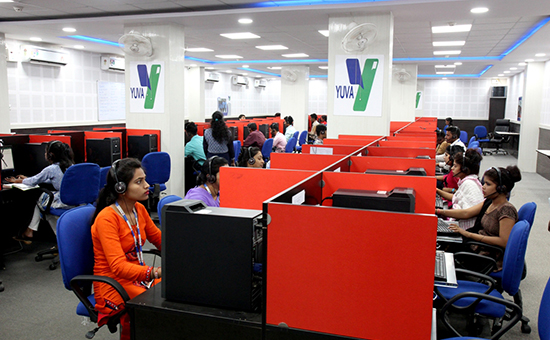 Call centre, YUVA, Dantewada Bastar, Chattisgarh.
Call centre, YUVA, Dantewada Bastar, Chattisgarh.
Seven, during an October 2018 visit to Dantewada in Bastar I visited a Call Centre made by the government. As on date of visit three I.T. companies operate having an employee strength of 457. The call centre started in December 2017 and has a capacity of 1,500.
Remember Dantewada
region is Naxal affected. Just last week the BJP MLA of Dantewada, Bheema
Mandvi and four others were
killed in a terrorist attack.
Eight, when the prices of LPG increased one was told that the subsidy would be transferred directly into our bank accounts. Many, including this author, wondered if government processes could be that efficient.
I was shocked to receive the subsidy within 3 days of the
cylinder being delivered and month after month.
For the first
time the government started a campaign to give up LPG Subsidy. According to
this Times of India report,
the number of users who gave up their subsidy was atleast one crore.
Nine, innocent home buyers getting duped by dubious builders is often heard.
The Real Estate (Regulation
and Development) Act, 2016 (RERA) was enacted 26 March 2016 whose provisions
came into effect on May 1 2017.
It was introduced to
protect the interests of home buyers and enhance transparency in the real
estate sector. Developers have to get their projects registered with RERA.
If a state does not notify
the rules on the basis of model rules framed under the central Act or passes
its own Act as West Bengal has done home buyers shall
suffer.
Ironically some blame RERA as one of the reasons for the
slow-down in the real estate sector.
Ten, notwithstanding the fact that UPA 2 started Aadhaar and did substantial work, this government passed the Aadhaar Act, even though it avoided a discussion in the Rajya Sabha by passing it as a money bill.
It held its
ground in the Supreme Court who held the Aadhaar Act to be constitutionally
valid. The honourable court also allowed mandatory linking of PAN (permanent
account number) with Aadhaar number.
An excerpt from
the book ‘The Aadhaar effect’ authored
by N S Ramnath and Charles Assisi. “Linking Aadhaar to financial investment and
bank accounts gave tax authorities better visibility of bad actors. Former
Reserve Bank of India governor Raghuram Rajan said, ‘By moving to an
Aadhaar-based system, you can get far better compliance on the flows’”.
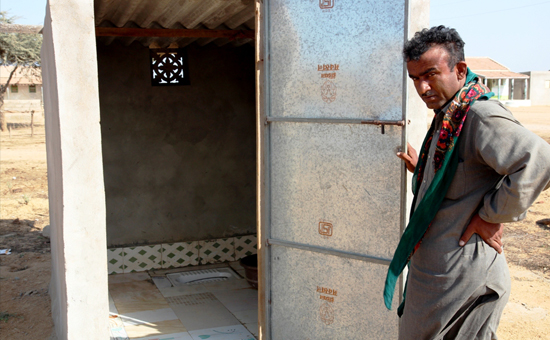 Toilet Rodasar Lucky village,
Fakirani Muslims, Narayan Sarovar Kutch, Feb 2018.
Toilet Rodasar Lucky village,
Fakirani Muslims, Narayan Sarovar Kutch, Feb 2018.
Eleven, this government has done little to give Hindus Equal Human Rights.
For example it
could have changed regulations to let Hindus manage their own temples (atleast
one major temple to start with) or removed the
distortions in the Right to Education Act.
“The law, that allegedly brings the benefit of quality
education to even the economically weaker segments of society, mysteriously
does not apply to minority schools.”
Instead of providing Hindus with an equal opportunities in government scholarships, “Mukhtar Abbas Naqvi, the Minister of State (IC) for Minority Affairs, informed the Rajya Sabha on 7 February 2017, that his government operates nine “schemes throughout the country (including the rural areas), for educational empowerment of six notified minority communities namely Muslim, Christian, Sikh, Buddhist, Jain and Parsi." Source
Twelve, notwithstanding endless litigation introduction of the Insolvency and Bankruptcy Code 2016 is a milestone.
Promoters now realize
they could lose their companies if mismanaged or default on bank loans.
Surely the IBC
Code has a long
way to go but no country has managed to implement it successfully from day
one.
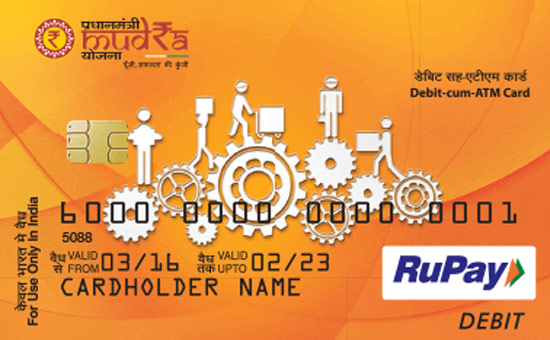 RuPay card.
RuPay card.
Thirteen, introduction of the domestic payments network RuPay.
According to this
MINT report,
“More than half of India’s 1 billion debit and
credit cards now go through the RuPay payment system, and that means companies
such as MasterCard face an uphill task to expand rapidly”.
Its success forced MasterCard to tell the U.S.
government that Modi government was using nationalism to promote RuPay.
Fourteen, this government that took a stand in the Supreme Court against Triple Talaq or instant divorce given by Muslim men to their wives.
For the first
time a government stood for gender equality amongst Muslims. It is unfortunate
that practice of ‘nikah halala’ and
polygamy continue.
Fifteen, emphasis on Digital India. A couple of weeks ago walked into a JIO showroom. They asked for my Aadhaar card and I got the sim in minutes. No photocopies-photograph, identity proof. Paper saved means trees saved.
According to a
March 2019 Mckinsey report,
“By many measures, India is well
on its way to becoming a digitally advanced country. India had 560 million internet subscribers in September 2018, second
only to China. The share of Indian adults with at least one digital financial
account has more than doubled since 2011, to 80 percent, thanks in large part to the government’s mass financial-inclusion
program, Jan-Dhan Yojana”.
“Almost 870 million bank accounts
were linked to Aadhaar by February 2018, compared with 399 million in April
2017 and 56 million in January 2014. Likewise, the Goods and Services Tax
Network, established in 2013, brings all transactions of about 10.3 million
indirect tax-paying businesses onto one digital platform, creating a powerful
incentive for businesses to digitize their operations”.
“Lower-income states like Uttar Pradesh and Jharkhand
are expanding internet infrastructure and increasing the penetration of
internet services to new customers faster than wealthier states. Uttar Pradesh
alone added close to 36 million internet subscribers between 2014 and 2018”.
Sixteen, the government knew that Vijay Mallya’s airline was in dire straits and owed huge sums to banks. How was he allowed to flee the
country then?
Hopefully
another NRI, whose airline is in dire straits, is not allowed to flee the
country?
Seventeen, India’s commercial capital Mumbai was always given step-motherly treatment when it came to infrastructure projects. For example the Coastal
Road was conceived in the mid 1970’s and land partially reclaimed but work began in 2019.
The simultaneous
construction of so many metro projects is
unprecedented and difficult in densely populated Mumbai. When completed it
shall make the commute easier.
Similarly
awarding contract for construction of the long pending Trans-Harbour Link shall
decongest Mumbai and develop the hinterland.
Eighteen, government has stopped the practice of taking journalists on board the Prime Minister’s plane during his trips abroad.
If journalists
want to cover a foreign trip, let their media house pick up the tab why
tax-payer!
Nineteen, this government constructed the world’s tallest statue. It
has ensured that the country acknowledges Sardar Patel’s contribution to modern
day India.
Read Why
Indian must remember Sardar Patel
Read Statue
of Unity do for Kevatia what Rann Utsav did for Kutch
Twenty, commitment to renewable energy.
According to a 2018
Business Today report,
“Solar energy capacity has gone up from 2.63 GW
in 2014 to 22 GW currently”. Crisil says
India will achieve a 70 GW installed solar watt capacity by March 2023, against
a government set target of 100 GW by 2022.
Sceptics will criticise the government for ambitious
targets but achievements are significant.
Twenty-one, defence expenditure as a percentage of GDP has been continuously falling. It was around 2.27% in 1992-93, 1.56 % (excluding pensions) in 2017 and 1.5% in 2019-20. Source
Ironically in
the pre-1962 days it was about 1.5%.
Security threats
have increased substantially yet India’s defence expenditure has not kept pace.
Twenty-two, two moves that shall reduce diesel consumption
and carbon foot print.
Notwithstanding
the hiccups in the implementation of GST, introduction of the E-way bill means trucks
do not wait at border check-post, and less paper documentation means fewer
trees cut.
Read Advantages
and Disadvantages of E-way bill system
In a first
Indian Railways, as part of its de-carbonization agenda, converted
a diesel locomotive into electric in December 2018.
Twenty-three, the 2017 government circular on sale of cattle for
slaughter was badly handled.
Instead the
government could have run a media campaign highlighting the ill-effects of beef
consumption. According to a 2019 article in TIME
magazine , “Americans are obsessed with
protein. Research
has found associations between diets heavy in red and processed meats and many
chronic diseases, including Type 2 diabetes, heart disease and cancer. Swapping beef for protein-rich plants like beans,
peas and nuts has big benefits not just for people’s health but also for the
health of the planet, according to a report published
in January by the World Economic Forum (WEF)”.
Syed Firdaus has
learnt from mistakes made in the West and wrote
how he has discovered love for vegetarian food and is losing weight too.
Twenty-four, MANN KI BAAT program. No prime minister has communicated directly, consistently and on such a wide range of topics.
National progress requires a change in thinking. What better way than through an old fashioned radio program.
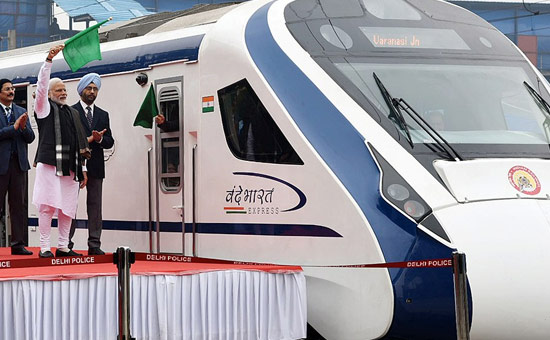 Train18, a semi high-speed train.
Train18, a semi high-speed train.
Twenty-five, deregulation of petroleum products pricing.
India has said good-bye to Oil Bonds and loading of petroleum
pricing deficit onto oil PSUs.
Today’s consumers
pay for what they consume unlike UPA who issued
oil bonds between 2005 and 2010 that are to be repaid during 2021-26.
Twenty-six, according to India Today issue
of April 22, 347 million LED bulbs were
distributed under the Ujala Scheme.
According to
this report
benefits are many for e.g. long life-span and energy efficient. Lower cost for
the aam aadmi.
Twenty-seven, successful organization of Ardha-Kumbh Mela 2019 at Prayagraj, the world’s largest peaceful gathering of pilgrims on Mother Earth.
No stampedes,
like what we saw at Allahabad
railway station in 2013 when 36 died. The deaths forced organiser in chief
Azam Khan to resign.
Twenty-eight, successful auctioning of natural resources like coal and spectrum.
Critics will
argue that actual revenue receipts by coal bearing states is less than claimed.
However, E-auctions mean Coalgate and 2G scam are history.
Twenty-nine, Aggregate Technical & Commercial losses (AT&C) of state electricity boards across India were 26.6% in financial year 2011-12, 25.2% in 2014-15 (first year of Modi government) and 18.8% in 2018-19.
There has been a
significant drop in loss percentage from 26.6 to 18.8. The caveat is that the
18.8 number excludes states of West Bengal and Odisha, two states that did not
sign UDAY (Ujwal DISCOM Assurance Yojna).
Although
AT&C is the responsibility of the State governments, this government can
claim some credit. Hope it can motivate states to achieve FY 19-20 target of
15%.
Thirty, Modi is the only Indian Prime Minister whom the Russians, Americans, Arabs and Pakis want re-elected.
Most Indians are good at finding fault, do not know how to appreciate good work or say thank you.
Author is a Chartered Accountant, Independent Columnist and founder www.esamskriti.com.
Also read
1 There is more to Bastar than Naxalism
2 IDEA behind Farmer Income Support is JAI TECHNOLOGY JAI KISAN
3 Looking beyond Farmer Loan write offs
4 Can India stop being obsessed with salaried jobs
5 Panic, chaos, excitement but Indian has welcomed Modi's demonetization drive
6 BIG IDEAS for MODI2